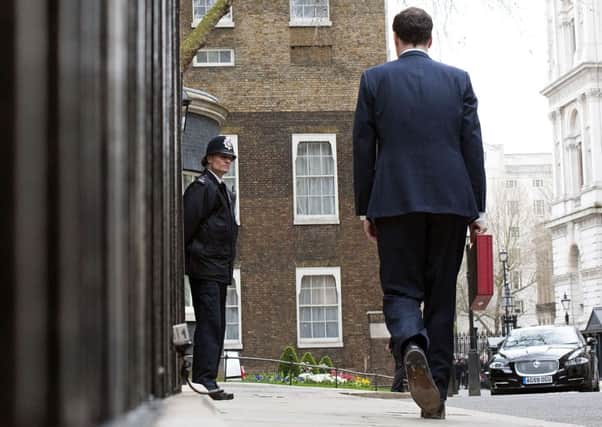Budget for middle Britain but debt looms large


Whether yesterday’s Budget will help the Conservatives win the 2015 election or not is too soon to say, but the initial reflection is that it certainly has not done his party any harm. Mr Osborne at least showed a rather deft understanding of people’s concerns.
Yet the economic landscape from which he dug out some largesse is still forbidding. Things are at least heading in the right direction. This year’s public spending deficit is coming in a little bit lower than expected, it should reduce a little bit faster than expected, and the national debt peak will be a little bit lower than forecast. These are marginal differences in mountainous problems.
Advertisement
Hide AdAdvertisement
Hide AdHis Budget had a curiously old-fashioned feel to it, which is no bad thing. His most prominent moves were to give help to neglected areas – manufacturing industry and savers. Both have reason to believe that they have been sorely treated over the past decade, some would argue for even longer than that.
Mr Osborne seems to have grasped that manufacturing held up a lot better than services during the recession and that encouraging it to grow makes a lot of sense. It is unlikely that British manufacturing can come to rival German manufacturing in its contribution to that country’s economy, but there is still every reason to believe that a bigger manufacturing sector makes for a more solidly-based economy and more reliable employment.
While those in work may think they have a hard time of it during the recession, savers have had a much harsher time. Interest rates at record low levels may be good for business and mortgage holders, but it is desperate for those who depend on income from savings. Helping old people who have done the right thing by saving for retirement, only to discover they are helplessly unable to prevent their income from dwindling, is certainly an important step in the right direction. Meagre rewards from saving also discourage income-earners from putting money aside to help in hard times or in old age.
Many have become aware that saving into a pension fund traps them into buying an annuity, recouping the full value from that requires living for more than 20 years after retirement, but on a fixed income, which will fall in its real value.
Giving future retirees much more flexibility and choice over their retirement fund is a long-overdue reform, which will benefit individuals and also assist the economy by encouraging a return to cannier ways with money.
And there was help, too, for the workers, especially those at the bottom end of the income scale, with uplifts to the minimum pay and the income tax threshold. These elements of the Budget go a long way to address some basic concerns of middle Britain: a worry that the country no longer seems to manufacture very much; work doesn’t pay enough and that thrift is no longer rewarded. It reflects concerns of a silent, grumblingly uneasy majority – those who collect special offer tokens, seek out bargains, and are careful with their money.
Who will pay for this? Those climbing up the income ladder will as, despite the slight increase in the income threshold at which 40 per cent tax is paid, it will still be about £2,000 lower in real terms than when the coalition took office. Public sector workers, many of whose incomes are dropping in real terms, will too and capping the welfare bill will also make a contribution.
Life for many of the poorest, and those who depend on public services, now being cut in the UK by £2 billion in real terms every year until 2018-19, will get tougher. But a cold political truth is that cutting the welfare bill has broad electoral support. Even more coldly, Mr Osborne pointedly praised his Liberal Democrat deputy, Danny Alexander, as the cutter-in-chief.
Advertisement
Hide AdAdvertisement
Hide AdA pre-election Budget then, but not a pre-referendum Budget. The freeze on whisky duty would probably have been made regardless. The referendum choice Mr Osborne poses is simply between himself doing what he can to make life easier, and the uncertainties of independence dependent on volatile oil revenues.
But behind his cheery titbits still looms a dark and foreboding shape – a huge deficit, an overhanging cliff of national debt, and miserly fingers of austerity picking at the pockets of the poor.